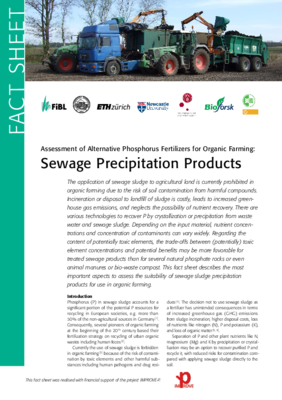Phosphorus (P) is one essential element for plant, which can neither be produced synthetically nor substituted by any other element. In organic farming, long term P management is one of the most important management challenges, as high soluble P fertilizers derived from fossil sources are not allowed and their use does not meet the basic ideas of closing nutrient cycles by effective management measures. The application of sewage sludge to agricultural land is currently prohibited in organic farming due to the risk of soil contamination from harmful compounds. Incineration or disposal to landfill of sludge is costly, leads to increased greenhouse gas emissions, and neglects the possibility of nutrient recovery. There are various technologies to recover P by crystallization or precipitation from waste water and sewage sludge. Depending on the input material, nutrient concentrations and concentration of contaminants can vary widely. Regarding the content of potentially toxic elements, the trade-offs between (potentially) toxic element concentrations and potential benefits may be more favorable for treated sewage products than for several natural phosphate rocks or even animal manures or bio-waste compost.
Further information
Contact
Paul Mäder, FiBL Switzerland
Links
- shop.fibl.org: Assessment of Alternative Phosphorus Fertilizers for Organic Farming: Sewage Precipitation Products
- improve-p.uni-hohenheim.de: Information on the IMPROVE-P project





